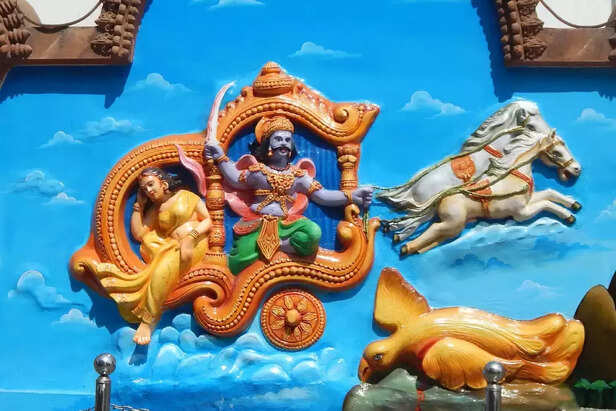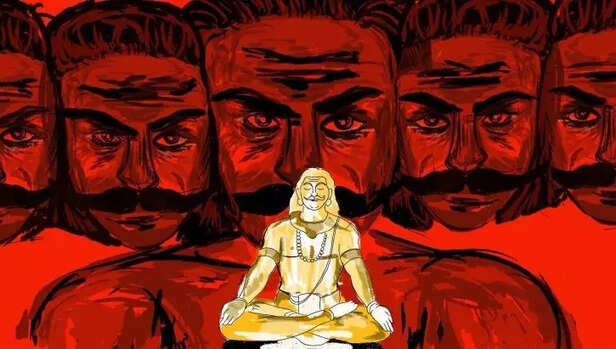The Real Reason Why SHIVA Grants Power to Asuras!
Nidhi | Mar 03, 2025, 23:13 IST
Shiva
( Image credit : Times Life Bureau )
Why does Lord Shiva, the destroyer and protector, grant boons to Asuras, even when they misuse their power? This article explores the deeper meaning behind Mahadev’s impartiality, his cosmic role in maintaining balance, and the philosophical lessons hidden in these divine acts. Through mythological stories and spiritual insights, discover how Shiva’s boons are not mere gifts but a reflection of karma, devotion, and the greater cosmic order.
"नमः शम्भवे च मयोभवे च नमः शङ्कराय च मयस्कराय च। नमः शिवाय च शिवतराय च॥"
("Salutations to Shambhu, the giver of joy, to Shankara, the bestower of blessings. Salutations to Shiva, the most auspicious of all.")
Lord Shiva is an enigma, a deity who transcends conventional understanding of good and evil. Unlike other gods who intervene to establish dharma, Shiva exists beyond judgment, granting boons to both devas and asuras alike. This raises an intriguing question: Why does Mahadev, the very destroyer of evil, empower the beings who often disrupt cosmic balance?
The answer lies in his nature—Shiva is not a ruler of morality but a force of pure consciousness. He does not distinguish between right and wrong; he only responds to dedication, penance, and surrender. Through the stories of asuras who received his blessings, we uncover a deeper cosmic truth about devotion, discipline, and the ultimate purpose of power.
 Shiva’s role in the cosmos is unique—he does not actively shape destiny like Vishnu, nor does he enforce cosmic order like Brahma. Instead, he remains detached, embodying the principle of pure existence.
Shiva’s role in the cosmos is unique—he does not actively shape destiny like Vishnu, nor does he enforce cosmic order like Brahma. Instead, he remains detached, embodying the principle of pure existence.
He grants boons not based on virtue but on the intensity of one's spiritual discipline (tapasya). Whether it is an asura or a deva, Shiva is bound by the law of spiritual effort. His impartiality teaches a profound truth: the universe rewards dedication, not just righteousness.

Ravana was not merely a demon king; he was a scholar, a musician, and an ardent devotee of Mahadev. He composed the Shiv Tandav Stotra and offered his own heads as sacrifice, proving his unwavering bhakti. Shiva, moved by his devotion, granted him immense power.
Yet, his downfall came from ego. He saw himself as invincible, leading him to abduct Sita and ultimately perish at the hands of Lord Rama.
Lesson: Devotion without humility is dangerous—it leads to arrogance, and arrogance leads to destruction.
Bhasmasura was a simple asura who sought Shiva’s blessings through severe penance. Pleased, Shiva granted him the ability to turn anything to ashes with a mere touch. But intoxicated by power, Bhasmasura sought to test the boon on Shiva himself.
Lord Vishnu, taking the form of the enchantress Mohini, tricked him into using his own power against himself.
Lesson: The universe does not discriminate in granting power, but the responsibility of using it wisely falls upon the recipient. Power without wisdom leads to self-destruction.
Andhaka, born from Shiva’s own sweat, was blind and initially unaware of his divine origins. As he grew in strength, he sought power and attacked Mount Kailash to claim Parvati as his own. However, upon realizing his mistake and surrendering, Shiva did not punish him but instead accepted him as his own son.
Lesson: Even those who fall into darkness can be redeemed through realization and surrender.

Shiva’s blessings are not acts of favoritism but manifestations of cosmic law. When an individual, be it a deva or an asura, dedicates themselves to rigorous austerities, they tap into a fundamental truth—the universe rewards persistence.
However, power is neutral. A sword can be used to protect or to destroy, and Shiva, being the embodiment of detachment, does not interfere in how it is used.
 Whenever an asura embarks on severe penance, the devas grow uneasy. They understand that Shiva, unlike Vishnu or Brahma, does not discriminate—his boons are granted based on merit alone. This impartiality often shifts the balance of power in favor of the asuras, leading to conflicts that require divine intervention.
Whenever an asura embarks on severe penance, the devas grow uneasy. They understand that Shiva, unlike Vishnu or Brahma, does not discriminate—his boons are granted based on merit alone. This impartiality often shifts the balance of power in favor of the asuras, leading to conflicts that require divine intervention.
 One of Shiva’s most profound aspects is his role as both creator and destroyer. Many of the boons he grants lead to the rise of asuras, which in turn necessitates their downfall—setting in motion the cycle of destruction and renewal.
One of Shiva’s most profound aspects is his role as both creator and destroyer. Many of the boons he grants lead to the rise of asuras, which in turn necessitates their downfall—setting in motion the cycle of destruction and renewal.
 Through these stories, one fundamental truth emerges: Shiva’s boons, though powerful, are transient. The asuras who seek strength ultimately fall, while those who seek wisdom attain something far greater—liberation (moksha).
Through these stories, one fundamental truth emerges: Shiva’s boons, though powerful, are transient. The asuras who seek strength ultimately fall, while those who seek wisdom attain something far greater—liberation (moksha).
The greatest lesson from Shiva’s impartiality is that devotion alone is not enough; one must also seek self-awareness. Power fades, kingdoms fall, but the soul’s journey toward enlightenment remains eternal.
Final Reflection: Do we seek temporary power, or do we seek eternal wisdom? Shiva does not deny us either, but only one leads to true freedom.
As you stand before Mahadev in prayer, what will you ask for?
("Salutations to Shambhu, the giver of joy, to Shankara, the bestower of blessings. Salutations to Shiva, the most auspicious of all.")
Lord Shiva is an enigma, a deity who transcends conventional understanding of good and evil. Unlike other gods who intervene to establish dharma, Shiva exists beyond judgment, granting boons to both devas and asuras alike. This raises an intriguing question: Why does Mahadev, the very destroyer of evil, empower the beings who often disrupt cosmic balance?
The answer lies in his nature—Shiva is not a ruler of morality but a force of pure consciousness. He does not distinguish between right and wrong; he only responds to dedication, penance, and surrender. Through the stories of asuras who received his blessings, we uncover a deeper cosmic truth about devotion, discipline, and the ultimate purpose of power.
1. The Supreme Observer: Shiva’s Unwavering Impartiality

Shiv and Ravana
( Image credit : Times Life Bureau )
He grants boons not based on virtue but on the intensity of one's spiritual discipline (tapasya). Whether it is an asura or a deva, Shiva is bound by the law of spiritual effort. His impartiality teaches a profound truth: the universe rewards dedication, not just righteousness.
The Law of Effort Over Morality
- Ravana, though a powerful demon, was also one of Shiva’s greatest devotees. His sincere devotion and extreme penance earned him divine blessings, despite his later misuse of power.
- Bhasmasura performed severe austerities, and Shiva granted him a devastating boon without questioning his intentions.
- Conversely, many so-called "righteous" beings who lacked true discipline never attained such rewards.
2. The Boons That Changed the Universe

Ravana
( Image credit : Times Life Bureau )
Ravana: Devotion Without Humility Leads to Ruin
Yet, his downfall came from ego. He saw himself as invincible, leading him to abduct Sita and ultimately perish at the hands of Lord Rama.
Lesson: Devotion without humility is dangerous—it leads to arrogance, and arrogance leads to destruction.
Bhasmasura: The Power That Consumes
Lord Vishnu, taking the form of the enchantress Mohini, tricked him into using his own power against himself.
Lesson: The universe does not discriminate in granting power, but the responsibility of using it wisely falls upon the recipient. Power without wisdom leads to self-destruction.
Andhaka: From Darkness to Light
Lesson: Even those who fall into darkness can be redeemed through realization and surrender.
3. The Cosmic Law: Shiva Does Not Grant Boons, He Grants Results

Ravana
( Image credit : Times Life Bureau )
Shiva’s blessings are not acts of favoritism but manifestations of cosmic law. When an individual, be it a deva or an asura, dedicates themselves to rigorous austerities, they tap into a fundamental truth—the universe rewards persistence.
However, power is neutral. A sword can be used to protect or to destroy, and Shiva, being the embodiment of detachment, does not interfere in how it is used.
Why Shiva Grants Boons Without Questioning Intentions
- The universe operates on action and consequence (karma), not personal judgment.
- Shiva represents tapasya itself—discipline and devotion will always yield results, regardless of the seeker’s nature.
- The responsibility of wielding power wisely lies with the recipient, not the giver.
4. The Devas’ Fear of Shiva’s Boons to Asuras

Shiva
( Image credit : Times Life Bureau )
The Devas vs. Asuras: A Metaphor for Human Nature
- Devas represent order and preservation—they rely on dharma and structured paths to sustain creation.
- Asuras represent ambition and raw energy—they challenge the existing order through sheer willpower.
- Both are necessary forces in the cosmic cycle, but imbalance leads to conflict.
5. The Paradox of Destruction and Creation

Shiv Tandav
( Image credit : Times Life Bureau )
Why Shiva Allows the Cycle to Continue
- Shiva is beyond attachment—he does not interfere in the natural order but lets actions unfold according to their consequences.
- The destruction of asuras is not punishment but a part of the cosmic rhythm.
- Even devas, when consumed by arrogance, are humbled by the same laws of karma.
6. The Ultimate Truth: Seeking Liberation, Not Power

Shiva
( Image credit : Freepik )
The greatest lesson from Shiva’s impartiality is that devotion alone is not enough; one must also seek self-awareness. Power fades, kingdoms fall, but the soul’s journey toward enlightenment remains eternal.
Final Reflection: Do we seek temporary power, or do we seek eternal wisdom? Shiva does not deny us either, but only one leads to true freedom.
As you stand before Mahadev in prayer, what will you ask for?
